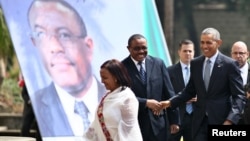U.S. President Barack Obama’s historic visit to Ethiopia has illuminated the complexity of that relationship, in which Ethiopia serves as a valuable security ally and a bulwark against terrorism -- and the U.S., as a major aid donor and economic stimulator.
Obama and his Ethiopian counterpart, Prime Minister Hailemariam Desalegn, were quick to tout the strong ties between their nations during Obama’s two-day state visit here.
“Ethiopia and the United States share a long friendship,” Obama said. He called Ethiopia an “outstanding partner" for its contribution to the fight against terrorism in East Africa. He also praised Ethiopia and regional mediators for trying to broker a solution to the conflict that is tearing apart the world’s youngest nation, South Sudan.
Hailemariam, in turn, noted that, Obama’s visit “could not have come at a better time, as the leader of the most powerful nation on Earth, diplomatically, economically, and more importantly, in science and technology and education -- the very things Africa and Ethiopia need in abundance if they are to sustain their growth.”
Close relationship
Ethiopia’s state foreign affairs minister, Berhane Gebre-Christos, told VOA on the sidelines of the meeting that the two nations have long been close.
“Ethiopia and the United States have absolute convergent interests,” he said. “And these interests always have been bringing us together. But today, the interests will be more articulated. And the U.S.-Ethiopia relationship will be extremely solidified.”
But as both leaders noted, they don’t always agree -- and critics of the close relationship have pointed to Ethiopia’s poor human rights record as a major sticking point. The U.S. State Department listed a litany of concerns in its most recent human rights report, including “restrictions on freedom of expression … restrictions on freedom of association, including through arrests; politically motivated trials; and harassment and intimidation of opposition members and journalists.”
Democracy
Obama alluded to that - briefly - when he said he and Hailemariam had “frank discussions” behind closed doors about Ethiopia’s progress towards democratization.
“Our commitment to democracy is real, not skin-deep,” Hailemariam said, but noted that the two nations have “minor differences here and there, with regard mainly to the speed with which our democratization process is moving.”
Differences aside, the two leaders say they are compelled to cooperate because of their mutual fear of the threat posed by militant groups like Somalia’s al-Shabab. The enormity of that threat was underscored on Sunday, when the group bombed a Mogadishu hotel used by diplomats and foreigners, killing at least 18 people.
“Cooperation,” Hailemariam said, “is essential to curb the menace posed by terrorism."










